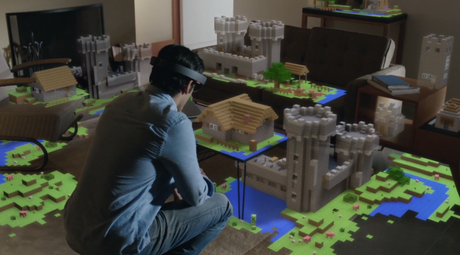“This is your world with holograms”.
That was how Alex Kipman, the creator of Kinect, presented to HoloLens glasses during the event Windows 10 on Wednesday: an event that was beyond the operating system. The HoloLens are a pair of glasses that create three-dimensional immersive virtual worlds that blend with the real world

The HoloLens promise dive into a virtual world full of holograms and augmented reality.
Photo: Microsoft / Microsoft
often mentioned the word “hologram” during the presentation of the HoloLens. Microsoft calls its immersive technology as Windows Holographic. For developers, the technology to create Windows apps is called Holographic.
But, are these holograms? No, because you can see them in the context of the real world. As you will see these ‘holograms’ when you have placed the HoloLens
But there is a term for what they can do these glasses. Augmented reality. It is a term that, in fact, has already existed and been around the world for years. The Holographic HoloLens and Windows are an attempt to refine this term, and perhaps give a boost to its image to augmented reality has more acceptance among the general public.
Reality increased (AR, for its acronym in English) is simply combine objects and virtual worlds to ours, overlapping. Augmented reality is virtual reality coupled with real life.
“We’re not talking about get in virtual worlds.”
Kipman also said that, although this is its intention and that of Microsoft. The worlds created by HoloLens are equally immersive: Minecraft 3D versions that are displayed on your walls, missions to Mars or games that are scattered on your coffee table. So why use the word hologram? Because, I think, gives a tone of immediacy. Sounds like something more familiar to us. People have seen holograms. People have not tried augmented reality.
On the other hand, is brewing a territorial battle, not only in the field of virtual reality but also in the arena of augmented reality . Oculus has dominated the field of virtual reality, augmented reality but is practically an open field. Google Glass ventured into the area. Meanwhile, smart glasses Epson Moverio have explored this area. Companies like Magic Leap are preparing to launch potentially spectacular proposals. Will Google preparing its own model augmented reality to its developer conference? I say we should: in fact, last year a couple of examples that include augmented reality experience in an aquarium used Tablet Project Tango and a pair of glasses were presented

Imagine playing ‘Minecraft’ or surf the Internet with hand gestures and voice commands.
Photo: Microsoft
This battle pound is not only between technologies and platforms, but also between creative talent and develop apps. Kipman extended an invitation to developers of apps to explore HoloLens and Windows Holographic
“You want to create an app Holographic It’s easy Developers:?. Windows 10 is of you.”.
The apps and developers are key. Windows are the disadvantage against Android and iOS. In addition, resources are limited and new technologies vary greatly. Even in the area of virtual reality, there is no common language for its development. ¿Dhahran developers jump to HoloLens and Windows Holographic? Who knows, but Microsoft hopes so. Kipman launched another invitation.
“Developer Oculus, Magic Leap and Glass, we invite you to create holograms with us.”
The ‘ hologram ‘may be an attempt to cling to a familiar icon in order to market it and make it more attractive to both ordinary people and developers. The HoloLens not about holograms … but in the end, may be the best way to describe the experience they offer. It may be a smart move on the part of Microsoft -. A necessary action if we consider what lies ahead
Scott Stein – More on CNET in Spanish
No comments:
Post a Comment